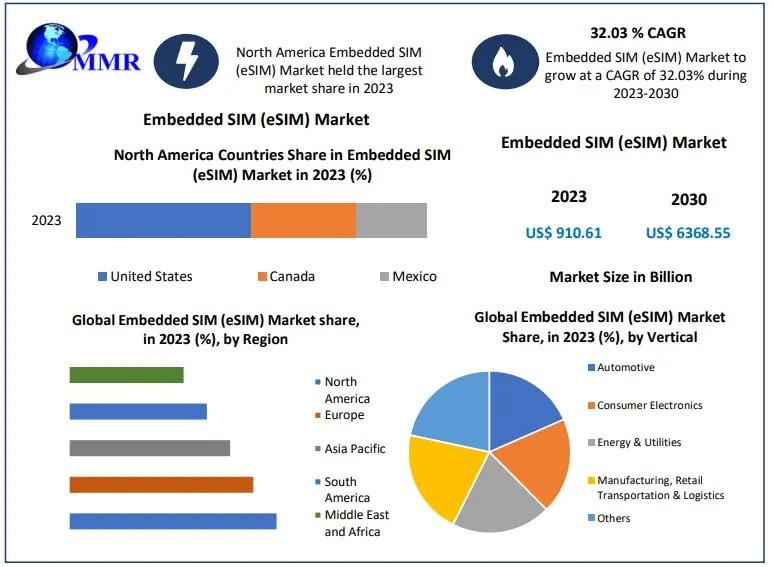Embedded SIM Market Size Forecast: Growth Projections Through 2030

Advancements in IoT and Consumer Electronics Drive Market Expansion
Embedded SIM Market Size is experiencing significant growth, with projections indicating an increase from USD 910.61 million in 2023 to approximately USD 6.37 billion by 2030, representing a robust compound annual growth rate (CAGR) of 32.03% during the forecast period.
Market Definition and Overview
An Embedded SIM, or eSIM, is a programmable chip embedded directly into devices such as smartphones, tablets, wearables, and IoT devices during manufacturing. Unlike traditional physical SIM cards, eSIMs allow users to remotely program and switch between multiple mobile network profiles without the need to physically replace the SIM card. This technology offers enhanced convenience, flexibility, and security, particularly beneficial for travelers and IoT applications requiring seamless connectivity across various regions.
Market Growth Drivers and Opportunities
Several key factors are propelling the expansion of the eSIM market:
- Proliferation of IoT Devices: The rapid growth of the Internet of Things (IoT) has led to an increased demand for seamless and reliable connectivity solutions. eSIM technology facilitates remote provisioning and management of devices, making it ideal for IoT applications across industries such as automotive, healthcare, and smart cities.
Get Your Free Sample Explore the Latest Market Insights: https://www.maximizemarketresearch.com/request-sample/3132/
- Advancements in Consumer Electronics: Leading consumer electronics manufacturers are integrating eSIM technology into their products, including smartphones, tablets, and wearables. This integration enhances user experience by enabling easy activation and switching between network providers without the need for physical SIM cards.
- Enhanced Security Features: eSIMs offer improved security through tamper-resistant hardware and the ability to remotely manage and update credentials. This is particularly important for applications requiring robust security measures, such as mobile payments and sensitive data transmission.
- Environmental Sustainability: The adoption of eSIM technology reduces the need for physical SIM cards, contributing to environmental sustainability by minimizing plastic waste and the resources associated with SIM card production and distribution.
Segmentation Analysis
The eSIM market is segmented based on application, vertical, and region.
- Application:
- Connected Cars: eSIMs enable automotive manufacturers to provide seamless connectivity for navigation, infotainment, and emergency services, enhancing the overall driving experience.
- Laptops and Tablets: Integration of eSIMs in laptops and tablets allows users to access mobile networks without relying on Wi-Fi, providing greater flexibility for remote work and travel.
- M2M (Machine-to-Machine): eSIM technology supports efficient communication between machines in industrial automation, logistics, and other sectors, facilitating real-time data exchange and operational efficiency.
- Smartphones: eSIMs offer consumers the flexibility to switch carriers and manage multiple profiles on a single device, enhancing user convenience.
- Wearables: Devices such as smartwatches benefit from eSIM integration by maintaining constant connectivity without tethering to smartphones.
- Vertical:
- Automotive: The automotive industry leverages eSIM technology for connected car services, including real-time traffic updates, remote diagnostics, and over-the-air updates.
- Consumer Electronics: Manufacturers of smartphones, tablets, and wearables incorporate eSIMs to offer users enhanced connectivity options and simplified device management.
- Energy and Utilities: eSIMs facilitate remote monitoring and management of utility assets, improving operational efficiency and service delivery.
- Manufacturing: Industrial IoT applications utilize eSIMs for machine connectivity, predictive maintenance, and process automation.
- Retail: Retailers employ eSIM-enabled devices for point-of-sale systems, inventory management, and personalized customer engagement.
FREE |Get a Copy of Sample Report Now: https://www.maximizemarketresearch.com/request-sample/3132/
Regional Analysis
North America:
North America leads the eSIM market, driven by technological advancements and the early adoption of IoT and connected devices. The presence of major technology companies and network providers in the region fosters a conducive environment for eSIM deployment. Additionally, consumer demand for flexible connectivity solutions propels market growth.
Europe:
Europe exhibits significant growth in the eSIM market, supported by regulatory initiatives promoting eSIM standardization and adoption. The region's strong automotive industry integrates eSIM technology for connected car applications, while consumers increasingly prefer eSIM-enabled devices for seamless cross-border connectivity.
Asia-Pacific:
The Asia-Pacific region is poised for substantial eSIM market expansion, attributed to the rapid proliferation of smartphones and IoT devices. Emerging economies in the region are witnessing increased demand for connected solutions, and governments are investing in smart city projects, further driving eSIM adoption.
Competitive Landscape
The eSIM market is characterized by the presence of key players striving to innovate and capture market share. Notable companies include:
- Gemalto N.V. (Thales Group): A global leader in digital security, offering comprehensive eSIM solutions for various applications, including consumer electronics and IoT devices.
- STMicroelectronics: Provides a range of eSIM hardware solutions designed for secure connectivity in IoT and M2M applications.
- Infineon Technologies AG: Offers advanced eSIM solutions focusing on security and reliability for mobile and IoT devices.
- Giesecke+Devrient GmbH: Specializes in eSIM management services, enabling seamless remote provisioning and lifecycle management for connected devices.
- NXP Semiconductors N.V.: Develops secure eSIM solutions integrated with advanced features for automotive, industrial, and consumer applications.
For additional reports on related markets, visit our website:
Conclusion
The global eSIM market is on a dynamic growth trajectory, driven by technological advancements, the proliferation of IoT devices, and the demand for flexible and secure connectivity solutions. As industries continue to innovate and integrate eSIM technology into their products and services, this market is poised to transform the landscape of connected devices, offering enhanced user experiences and operational efficiencies.
- Art
- Causes
- Crafts
- Dance
- Drinks
- Film
- Fitness
- Food
- Oyunlar
- Gardening
- Health
- Home
- Literature
- Music
- Networking
- Other
- Party
- Religion
- Shopping
- Sports
- Theater
- Wellness
- Travels

